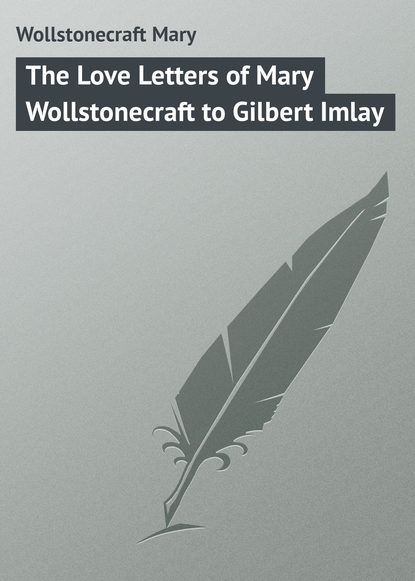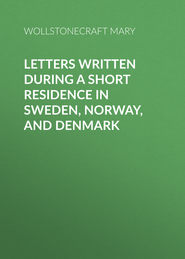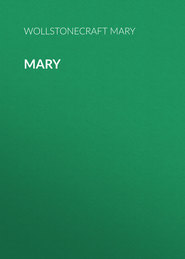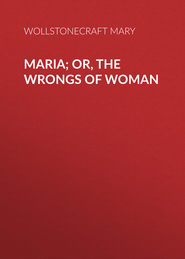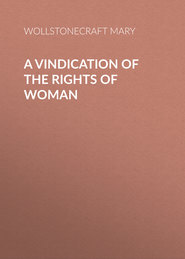По всем вопросам обращайтесь на: info@litportal.ru
(©) 2003-2024.
✖
The Love Letters of Mary Wollstonecraft to Gilbert Imlay
Автор
Год написания книги
2017
Настройки чтения
Размер шрифта
Высота строк
Поля
I have promised – to go with him to his country-house, where he is now permitted to dine – I, and the little darling, to be sure[5 - The child spoken of in some preceding letters, had now been born a considerable time. She was born, May 14, 1794, and was named Fanny. – W. G.]– whom I cannot help kissing with more fondness, since you left us. I think I shall enjoy the fine prospect, and that it will rather enliven, than satiate my imagination.
I have called on Mrs. – . She has the manners of a gentlewoman, with a dash of the easy French coquetry, which renders her piquante. – But Monsieur her husband, whom nature never dreamed of casting in either the mould of a gentleman or lover, makes but an aukward figure in the foreground of the picture.
The H – s are very ugly, without doubt – and the house smelt of commerce from top to toe – so that his abortive attempt to display taste, only proved it to be one of the things not to be bought with gold. I was in a room a moment alone, and my attention was attracted by the pendule– A nymph was offering up her vows before a smoking altar, to a fat-bottomed Cupid (saving your presence), who was kicking his heels in the air. – Ah! kick on, thought I; for the demon of traffic will ever fright away the loves and graces, that streak with the rosy beams of infant fancy the sombre day of life – whilst the imagination, not allowing us to see things as they are, enables us to catch a hasty draught of the running stream of delight, the thirst for which seems to be given only to tantalize us.
But I am philosophizing; nay, perhaps you will call me severe, and bid me let the square-headed money-getters alone. – Peace to them! though none of the social sprites (and there are not a few of different descriptions, who sport about the various inlets to my heart) gave me a twitch to restrain my pen.
I have been writing on, expecting poor – to come; for, when I began, I merely thought of business; and, as this is the idea that most naturally associates with your image, I wonder I stumbled on any other.
Yet, as common life, in my opinion, is scarcely worth having, even with a gigot every day, and a pudding added thereunto, I will allow you to cultivate my judgment, if you will permit me to keep alive the sentiments in your heart, which may be termed romantic, because, the offspring of the senses and the imagination, they resemble the mother more than the father,[6 - She means, “the latter more than the former.” – W. G.] when they produce the suffusion I admire. – In spite of icy age, I hope still to see it, if you have not determined only to eat and drink, and be stupidly useful to the stupid —
Yours,
MARY.
LETTER XXI
Havre, August 19 [1794] Tuesday.
I received both your letters to-day – I had reckoned on hearing from you yesterday, therefore was disappointed, though I imputed your silence to the right cause. I intended answering your kind letter immediately, that you might have felt the pleasure it gave me; but – came in, and some other things interrupted me; so that the fine vapour has evaporated – yet, leaving a sweet scent behind, I have only to tell you, what is sufficiently obvious, that the earnest desire I have shown to keep my place, or gain more ground in your heart, is a sure proof how necessary your affection is to my happiness. – Still I do not think it false delicacy, or foolish pride, to wish that your attention to my happiness should arise as much from love, which is always rather a selfish passion, as reason – that is, I want you to promote my felicity, by seeking your own. – For, whatever pleasure it may give me to discover your generosity of soul, I would not be dependent for your affection on the very quality I most admire. No; there are qualities in your heart, which demand my affection; but, unless the attachment appears to me clearly mutual, I shall labour only to esteem your character, instead of cherishing a tenderness for your person.
I write in a hurry, because the little one, who has been sleeping a long time, begins to call for me. Poor thing! when I am sad, I lament that all my affections grow on me, till they become too strong for my peace, though they all afford me snatches of exquisite enjoyment – This for our little girl was at first very reasonable – more the effect of reason, a sense of duty, than feeling – now, she has got into my heart and imagination, and when I walk out without her, her little figure is ever dancing before me.
You too have somehow clung round my heart – I found I could not eat my dinner in the great room – and, when I took up the large knife to carve for myself, tears rushed into my eyes. – Do not however suppose that I am melancholy – for, when you are from me, I not only wonder how I can find fault with you – but how I can doubt your affection.
I will not mix any comments on the inclosed (it roused my indignation) with the effusion of tenderness, with which I assure you, that you are the friend of my bosom, and the prop of my heart.
MARY.
LETTER XXII
Havre, August 20 [1794].
I want to know what steps you have taken respecting – . Knavery always rouses my indignation – I should be gratified to hear that the law had chastised – severely; but I do not wish you to see him, because the business does not now admit of peaceful discussion, and I do not exactly know how you would express your contempt.
Pray ask some questions about Tallien – I am still pleased with the dignity of his conduct. – The other day, in the cause of humanity, he made use of a degree of address, which I admire – and mean to point out to you, as one of the few instances of address which do credit to the abilities of the man, without taking away from that confidence in his openness of heart, which is the true basis of both public and private friendship.
Do not suppose that I mean to allude to a little reserve of temper in you, of which I have sometimes complained! You have been used to a cunning woman, and you almost look for cunning – Nay, in managing my happiness, you now and then wounded my sensibility, concealing yourself, till honest sympathy, giving you to me without disguise, lets me look into a heart, which my half-broken one wishes to creep into, to be revived and cherished. – You have frankness of heart, but not often exactly that overflowing (épanchement de cœur), which becoming almost childish, appears a weakness only to the weak.
But I have left poor Tallien. I wanted you to enquire likewise whether, as a member declared in the convention, Robespierre really maintained a number





